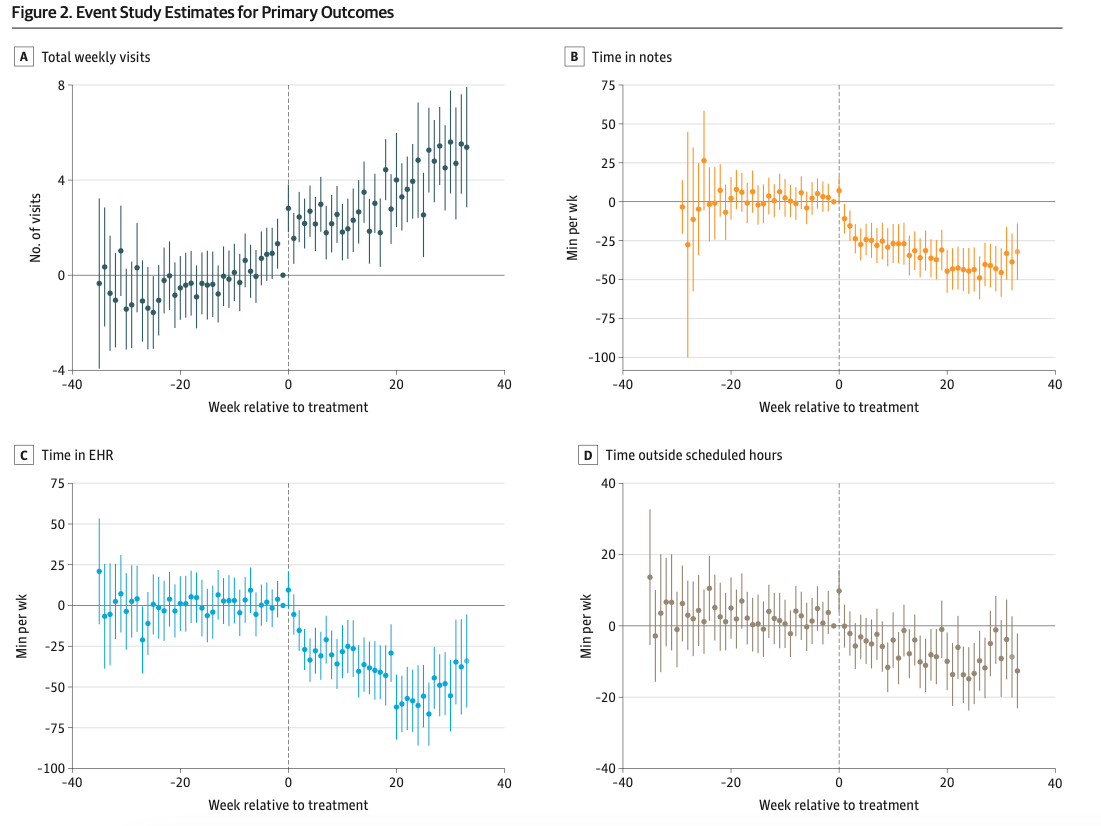Nation's First Large-Scale Study Evaluates Impact of Team-Based Documentation on Physician EHR Burden and Productivity
The study, published today in JAMA Internal Medicine, finds that team-based documentation dramatically improves productivity and reduces EHR burden.

While electronic health records (EHR) have revolutionized clinical care and enhanced data sharing across the healthcare system, physicians are grappling with an unintended consequence: an overwhelming increase in documentation demands that is straining their time and resources, leading to calls for a re-evaluation of the system's impact on frontline care providers. New research from UC San Francisco and collaborators from the University of Maryland and the University of Minnesota Twin Cities shows that team-based documentation dramatically improves productivity and reduces EHR burden.
The study is the first national, large-scale assessment of the impact of team-based documentation support – a popular intervention to reduce physician EHR time – on physician productivity and EHR burden.
The paper, “Physician EHR Time and Visit Volume Following Adoption of Team-Based Documentation Support,” was published on August 26, 2024, in JAMA Internal Medicine by A Jay Holmgren, PhD, MHI, assistant professor and associate chief for research in the UCSF Division of Clinical Informatics and Digital Transformation (DoC-IT) and director of the Center for Clinical Informatics and Improvement Research (CLIIR) – along with collaborators Nate Apathy, PhD, from the University of Maryland and Dori A. Cross, PhD, from the University of Minnesota Twin Cities.
EHR documentation burden on physicians has become a national policy priority, as well as a top issue for many health systems, as they seek strategies to reduce physician EHR time. While many strategies exist to streamline physician EHR work, one of the most common is the use of other members of the team – often dedicated scribes – to document care. Despite the widespread use of team-based EHR documentation, little evidence exists on the extent to which team-based documentation reduces physician EHR burden and whether physicians can increase productivity to make hiring additional team members cost-effective.
This new study tackles these critical issues and outstanding questions. The research team used a novel, national dataset of detailed EHR use metadata for 18,265 physicians and a difference-in-differences approach to assess the causal impact of team-based documentation on physician productivity and EHR burden.
Their results show adopting team-based documentation increases physicians' weekly visits by 6.0% while simultaneously decreasing their EHR burden by 4.1%. These effects intensify over time, and physicians with greater team-based support experience even larger benefits.
"These results highlight the importance of adapting clinical workflows, staffing, and team dynamics to the digital age: team-based documentation enables health systems to realize the benefits of EHRs to improve care while minimizing the administrative burden to physicians."
A Jay Holmgren, PhD, MHI
Associate Chief for Research and Assistant Professor, UCSF Division of Clinical Informatics and Digital Transformation (DoC-IT)
Director, UCSF Center for Clinical Informatics and Improvement Research (CLIIR)
While new technologies, such as EHRs, can generate significant benefits, they also challenge existing systems to adapt to new ways of working. Developing evidence like this on how to structure teams and work to maximize the benefits and minimize the costs of new innovations is critical to realizing the true benefits of digital tools in medicine.
Ultimately, ensuring that health systems and care teams are built for digital-enabled care is critical to unlocking the true potential of technology in medicine.
Read the publication here.
__
About the Authors

A Jay Holmgren, PhD, MHI
Associate Chief for Research and Assistant Professor, UCSF Division of Clinical Informatics and Digital Transformation (DoC-IT)
Director, UCSF Center for Clinical Informatics and Improvement Research (CLIIR)
Dr. Holmgren, recently appointed director of CLIIR, is an expert on the use of information technology in health care delivery. His research focuses on the impact of information technology on patients, clinicians, and healthcare organizations and seeks to identify strategies to improve the quality and experience of care using digital tools.

Nate Apathy, PhD
Assistant Professor of Health Policy & Management, University of Maryland School of Public Health
Dr. Apathy’s research sits at the intersection of health policy, health services research, and health informatics. I study the role of health information technology in support of delivery and payment reform efforts, the impact of regulations on health IT innovation, adoption, and use, and specialize in the use of system-generated log data to increase our understanding of health IT's impact on care quality.

Dori A. Cross, PhD
Associate Professor, University of Minnesota School of Public Health Division of Health Policy & Management
Dr. Cross’s research advances understanding of, and seeks solutions to, the complex management challenges that impede the digital transformation of healthcare organizations. Her conceptual and empirical research contributions identify the underlying socio-technical challenges that impede technology-supported teamwork and offer novel policy and practice insights to address these challenges.
About the UCSF Division of Clinical Informatics and Digital Transformation (DoC-IT)
DoC-IT serves as the academic home for applied clinical informatics researchers within the UCSF Department of Medicine. We also serve as a coordinating entity with key internal and external digital stakeholders across all UCSF mission areas, schools, departments, and divisions. Clinical informatics is approached as a multidisciplinary field that involves the use of technology by a broad spectrum of health professionals, patients, and other stakeholders.
Contact
Mika Rivera, Director of Communications
[email protected]
Follow Us
X (formerly Twitter): @UCSF_DoCIT
LinkedIn: www.linkedin.com/company/ucsf-doc-it